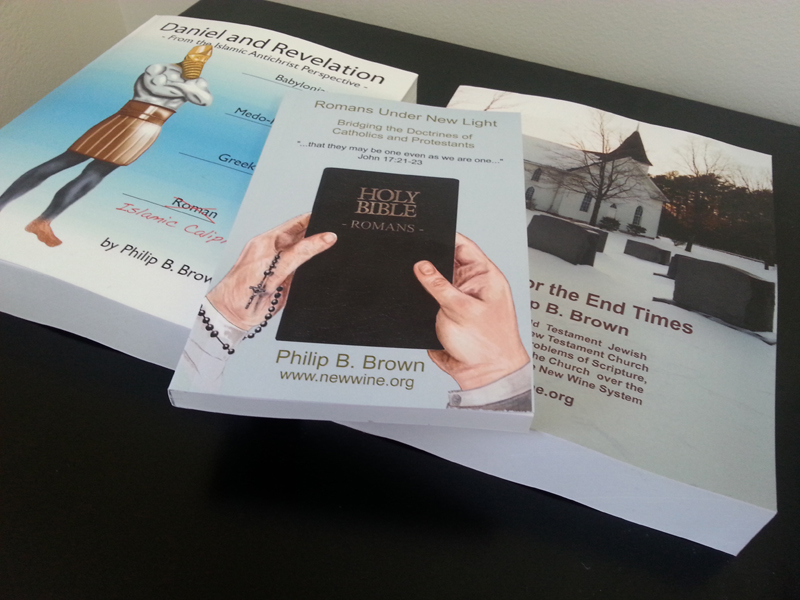The Gospel of the Kingdom: Reconciliation,
Justification, Sanctification,
and Glorification
"Through one trespass, all men were condemned; even so through one act
of righteousness, all men were justified to life" (Rom. 5:18). "For as
in Adam all die, so also in Christ all will be made alive" (1
Cor. 15:22).
"We were reconciled to God through the death of his Son" (Romans 5:10).
Jesus said, "I, if I am lifted up from the earth, will draw all people to myself."
(John 12:32). Paul said Jesus Christ is the, "Savior of all people, especially
of those who believe" (1 Tim. 4:10). See 1 Cor. 15:22, 1 John 2:2, Rom.
11:32, 1 Tim. 2:3-6, 1 John 2:2, Heb. 2:9, John 6:33, Titus 2:11, 2 Cor. 5:14-15, and Rom.
5:18-19. Reconciliation has nothing to do with what we might do, say, or believe
. We were all reconciled. But those who reject Christ lose their reconciliation
to God.
Reconciliation is not justification. New believers are justified and receive
the Holy Spirit. Justification is the start of sanctification, when we are credited
with righteousness. Later, after completing our journey of sanctification,
making good on that credit, we will be glorified with immortal bodies at the
resurrection. But we must complete that journey.
Jesus said, "I am the [road], the truth, and the life. No one [journeys] to the
Father, except through me" (John 14:6). Salvation includes a journey of faith.
Paul said, "May the God of peace himself sanctify you completely. May
your whole spirit, soul, and body be preserved blameless at the coming of our Lord Jesus
Christ" (1 Thess. 5:23).
Grace is God's presence or work. Paul said, "For by grace [God's
work] you have been saved through [continual] faith, and that not of yourselves;
it is the gift of God, not of [your] works, that no one would boast.
For we are his workmanship, created in Christ Jesus for good works, which God prepared
before that we would walk in them" (Eph. 2:8-10). We are not saved by
works. We are saved by God's work.
Sanctification is a free gift by grace (God's work) alone since the Holy Spirit changes
us on the inside. But without our works there is no sanctification and thus no
eternal life. Paul said, "But now, being made free from sin, and having
become servants of God, you have your fruit of sanctification, and the
result of eternal life" (Rom. 6:22). So without works as a servant, there
is no fruit of sanctification and thus no eternal life. Therefore, we must complete
our journey of sanctification before we can inherit the kingdom and receive eternal
life.
We are saved by faith and through grace. But faith without
works is dead (James 2:17, 2:26). Our belief and faith are not one-time events.
By faith and belief we are sanctified as we do the works of the Father. "He who
began a good work in you will complete it until the day of Jesus Christ" (Phil. 1:6).
"Follow after peace with all men, and the sanctification without which no man will
see the Lord" (Hebrews 12:14).
John 3:16, 18 For God so loved the world
, that he gave his one and only Son, that whoever believes in him should not
perish, but have eternal life. ... He who believes in him is not judged.
He who doesn't believe has been judged already, because he has not believed
in the name of the one and only Son of God.
Belief and faith are a journey. Those who willfully refuse Christ's journey are
judged already, which means they've lost their reconciliation. Those
who complete their journey to overcome sin will be given eternal life.
Those who fall short in this age will be able to continue their journey after the resurrection
in the age to come. But you can lose your reconciliation if you willfully
turn away from God and keep on sinning.
Hebrews 10:26-27 For if we sin willfully
after we have received the knowledge of the truth, there remains no more a sacrifice
for sins, but a certain fearful expectation of judgment, and a fierceness
of fire which will devour the adversaries.
Because Christ is the second Adam, all men were "justified to life." Even nonbelievers
who remain reconciled are Christ's sheep and still hear his voice.
Christ's lost sheep still hear his voice and remain reconciled with God, even
if they die. There are two types of bodies at the resurrection: glorified bodies
and mortal bodies. If you die before completing your journey, Christ will simply raise
you up with a mortal body. But you will still be under judgment.
You can complete your journey in the age to come. But those who reject Christ
no longer hear his voice. They have lost their reconciliation and will not
be resurrected.
John 5:25 Most certainly, I tell you, the
hour comes, and now is, when the dead will hear the Son of God's voice; and those
who hear will live.
John 5:28-29 Don't marvel at this, for
the hour comes, in which all that are in the tombs will hear his voice, and
will come out; those who have done good, to the resurrection of life; and
those who have done evil, to the resurrection of judgment.




